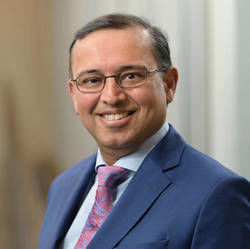Call Now Open
2026 Oxford-Harrington Rare Disease Scholar Award

Oncology
Novel Agents to Treat Cancers of the Head, Neck and Lungs
2018 Harrington Scholar-Innovator
For a scientist/surgeon, how validating would it be to see your long and dedicated research result in curing the very patients who would otherwise end up on your operating table? This may be the case one day for Dr. Singh, who each year performs 300–350 surgeries pertaining to head and neck cancers.
Squamous cell carcinomas of mucosal origin (mSCCs) include cancers originating in the lining of the lung, head and neck, and esophagus, and account for about one-fifth of all cancers worldwide.
Fifteen years ago Dr. Singh was identifying prognostic markers, work which ultimately led to his discovery of a novel gene, SCCRO (AKA DCUN1D1) that was involved in the development of these cancers. He spent years experimenting to understand how it functions, as pinpointing mSCC cancers is more difficult than, say, melanoma, where there are mutations in genes that are fairly common and can be targeted.
Dr. Singh's team has developed a promising compound that is able to inhibit activity in the SCCRO protein, and with support from Harrington Discovery Institute are optimizing it to prepare it for use in humans.
“It would be such a large step forward if we were able to improve responses to cancers of the head, neck and lung, and skin cancers like melanoma.”
Source: Article from 2018-19 Annual Publication.